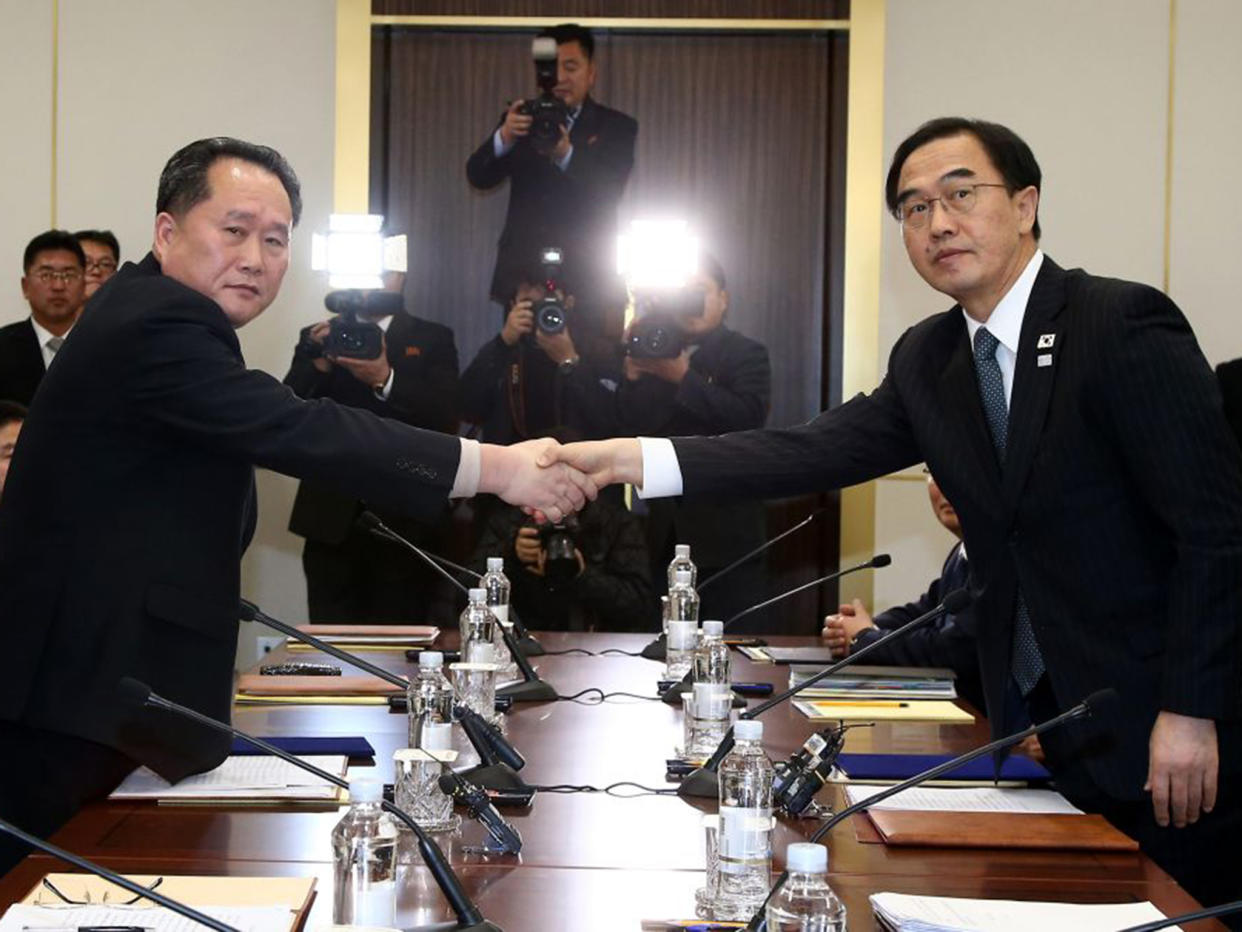This renewed diplomacy between North and South Korea could lead to something more – but we should be cautious

The significance of the talks between North and South Korea lies some way beyond the marginal involvement of a North Korean bobsleigh team in the Winter Olympics to be held south of the border.
As dramatic in their way as any test missile loosed off by Pyongyang into the far Pacific Ocean, they represent a significant easing in the tensions that have been building up towards crisis point in recent months, with angry – and usually babyish – rhetoric from Donald Trump and Kim Jong-un about the size of their nuclear buttons only adding to surreal atmosphere and risk of an apocalyptic, accidental war.
The hotline between Seoul and Pyongyang has undergone repair (a lengthy procedure on the northern side) and there is a vague feeing that Koreans should be able to sort out Korea’s problems. That has, of course, never been true, or else the war that began in 1950 would by now have had a peace treaty signed to end hostilities, rather than the longest running truce in the world.
What is even more hopeful, then, is that President Trump’s White House has indicated that it is open to the idea of jaw-jaw as well as war-war. Periodically, betwixt and between bad-tempered outbursts, Mr Trump and his Secretary of State, Rex Tillerson, have been making gentle public overtures to the North Koreans for some months. They have sought to reassure Kim, an understandably paranoid soul, that the United States does not seek regime change in Pyongyang, and has no wish to try to conquer the Democratic People’s Republic of Korea, hardly a ravishing prospect at the best of times.
The President of South Korea, Moon Jae-in, may have been diplomatically overgenerous in assigning a “huge” contribution to President Trump for this latest hopeful twist in the Korean saga, but it certainly seems to be the case that a determined tough stance, and, more crucially, ever-tighter UN sanctions being more enthusiastically applied by China, have prompted a change of mind by Kim Jong-un.
To his own generals and people, Kim can claim that, having developed some sort of long-range nuclear device that has a chance of reaching US territory – as well as South Korea, Japan and other Western allies – he can now relax a little and stand equal with the Yankees and their running dogs south of the DMZ. A summit between President Moon and Mr Kim is no longer unthinkable, and, wisely for a change, with the blessing of the White House.
Kim desperately needs foreign exchange for food and raw materials, as well as his military ambitions, and the South Koreans, a wealthy nation by any standards, are the easiest place to lay his hands on some easy money. Hence his uncharacteristic decision to “play nice”.
Cynics claim, with an increasingly strong body of evidence, that President Trump’s first reaction when faced with a piece of bad news is to deploy distraction techniques to move the new agenda away from whatever embarrassing revelation or firing or book is the latest to turn up on the news networks. If so, then a visit by The Donald to strike a deal personally with the hermit king of North Korea would be the circus to surpass all previous diplomatic circuses, including Richard Nixon’s historic trip to China to meet Mao in 1972. The meeting of the two most fragile and dangerous egos on the planet, with their equally strange hairstyles and dynastic entourages would be sufficient to take attention away from whatever Robert Mueller has next planned. A Trump-Kim summit is not impossible, though it might be more photo-op than anything meaningful.
Yet it remains difficult to be optimistic about the prospects for a long-term settlement on the Korean peninsula, and by extension the entire Asia-Pacific region. America’s formal position is that Kim should drop his nuclear weapons programme; yet there is no feasible personal incentive to do so. The new nuclear deterrent remains his sole insurance policy against the type of open military action he watched America take in Libya, Iraq, Afghanistan and Syria, as well as countless cover assassination attempts on unfriendly dictators the world over, with accompanying actual or attempted regime change.
Kim does not want to follow the fate of Saddam Hussein or Muammar Gaddafi. The political and economic systems of the North and South are, if anything, more incompatible than at any time since the partition of the country all those decades ago, which perversely means that the South may be less interested in the romantic appeal of reunification, given the burden the North would impose on the South’s economy and living standards. (The gulf between the two is much wider than, say, that between the two Germanies of 1990.)
Korea is not going to be united anytime soon, but it is not going to go to war either. At least not until the bobsleigh heats are over.

